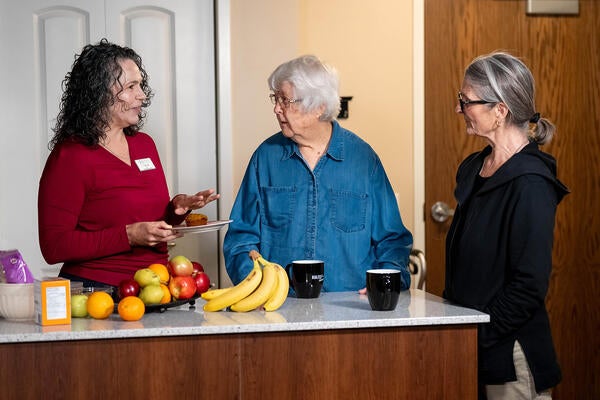
Waterloo developing a mobile alert app for missing people with dementia
New app aims to address a gap in available tools when it comes to alerts for missing older adults and people living with dementia in Canada

New app aims to address a gap in available tools when it comes to alerts for missing older adults and people living with dementia in Canada
By Media RelationsResearchers are working with community leaders to develop a mobile alert app to help locate missing people with dementia.
Noelannah Neubauer, a postdoctoral fellow at the University of Waterloo’s School of Public Health Sciences, said “Community ASAP” is aimed at addressing a gap in available tools when it comes to alerts for missing older adults and people living with dementia in Canada.
"We have Amber Alerts for missing children, but nothing for this population other than police and civilians circulating information via social media such as Twitter and Facebook,” said Neubauer, who is the first author of a study that tested the efficacy and useability of Community ASAP.
The U.S. already uses a system called Silver Alert, and there have been efforts in some provinces, such as British Columbia, to create a citizen-led alert system. The issue with piggybacking onto the Amber Alert system is that too many people go missing every day, according to Neubauer. Almost 750,000 Canadians live with dementia, and 60 per cent of them wander at least once, and some repeatedly.
“The sheer number of missing people from this population would mean that alerts would go off multiple times a day in certain jurisdictions, running the risk of significant alert fatigue,” Neubauer said. “Community ASAP gets around this by having people sign up to receive the alert on Android and iOS operating systems and choosing the radius from where the missing person was last seen to their current location. Most missing cases take place one kilometre from the place they were last seen.”
"A key concern is that if someone gets lost and is not found within 24 hours, they have a 50 per cent chance of experiencing serious injury or death," said Lili Liu, principal investigator, and dean of the Faculty of Health at Waterloo. "We proposed recommendations for community alert systems specific to Canada, such as Community ASAP, at an online national forum on community alert systems for missing older adults last fall."
For the study, researchers engaged people living with dementia, their care partners, police services, search and rescue organizations and health and social service providers in Ontario, Alberta and British Columbia to develop the alert system that engages community citizens, as volunteers, to look out for people with dementia reported missing.
They went through three iterations of the app and consulted with these stakeholder groups along the way to test its accuracy and useability, walking through scenarios to simulate the events that transpire during a missing person event. In these scenarios, participants assumed the key roles in the Community ASAP system, including the missing person with dementia, care partner, coordinator, and volunteers.
The idea for this app came from Ron Beleno, an entrepreneur with experience caring for his father, who lived with dementia. Beleno is turning Community ASAP into a start-up company, and Liu's research team continues to work with governments and organizations to coordinate a system that works across the country.
The study, "Mobile alert app to engage community volunteers to help locate missing persons with dementia," co-authored by Noelannah Neubauer, Christine Daum, Antonio Miguel-Cruz and Lili Liu, all affiliated with the University of Waterloo, was recently published in PLoS One.

Read more
The Government of Canada announces funding to support research in food policies and medical devices

Read more
How machine learning empowers collaboration between computer science, math and medical research

Read more
Dr. Heather Keller discusses the need to transform mealtimes in Canada’s long-term care homes from a service to a meaningful form of care
The University of Waterloo acknowledges that much of our work takes place on the traditional territory of the Neutral, Anishinaabeg, and Haudenosaunee peoples. Our main campus is situated on the Haldimand Tract, the land granted to the Six Nations that includes six miles on each side of the Grand River. Our active work toward reconciliation takes place across our campuses through research, learning, teaching, and community building, and is co-ordinated within the Office of Indigenous Relations.